This Valentine’s Day, 79 percent of couples say they would rather stay home and go to sleep on time, rather than go out and stay up late celebrating — but why?
If you’ve ever had a terrible night of sleep, you’ve likely experienced firsthand the not-so-pleasant feelings that sleep deprivation can cause. And when you wake up shivering at night just to find that your partner has stolen the covers, it sure can be challenging to keep your…cool.
With so many partners choosing to sleep next to each other, what happens when one — or both — partners cause sleep disturbances?
Sleepopolis surveyed over 1,000 adults in relationships across the US to see how America’s sweethearts are feeling about their sleep health. Most couples in our survey shared with us that they’re in need of more shut-eye, with over half saying that they’d feel more connected to their partner if they got better sleep.
Spoiler alert, the rest of the data might convince you and your boo to stay in and catch some extra Zzz’s this Valentine’s day. Read on to learn about the surprising results and what strategies Dr. Shelby Harris, Licensed Clinical Psychologist and Director of Sleep Health at Sleepopolis, recommends for partner sleep health
More Than One in Three People Do Not Sleep Better Next to Their Partner
You might’ve heard that sleeping next to a partner has some lovey-dovey benefits, so this one may be controversial; with regards to sleep quality, more than a third of people say that they don’t sleep better next to their partner.
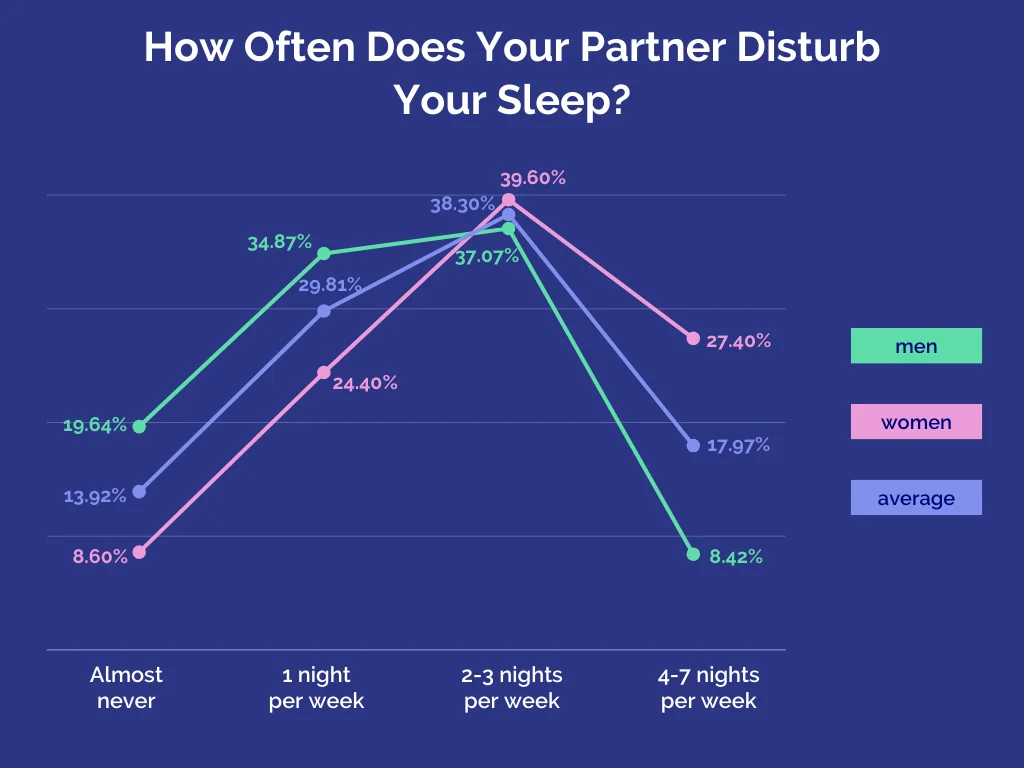
According to our survey, 56 percent of people are woken up by their partner two nights per week or more. You might ask, what is there to do if your partner sleeps better next to you, but you’re constantly woken up by their snoring or misaligned sleep schedule?
Dr. Harris tells Sleepopolis, “When one partner sleeps better than the other, it’s important to talk openly and find compromises. This might mean taking turns in different beds or improving the sleeping setup. Getting help for snoring or sleep problems, adjusting sleep schedules, and seeking advice can help solve these issues.”
Dr. Harris also suggests bringing these issues up, rather than sweeping them under the rug; “Ignoring these problems could lead to resentment, health problems, and communication issues. It’s essential to sort out sleep differences for a happier relationship.”
Over Half of People Would Feel More Connected to Their Partner if Their Sleep Disturbances Were Resolved
So, what impact are these sleep disturbances having on couples?
54 percent of people say that their relationship would be stronger if they got better sleep in general. This is probably because over half of people say that sleep deprivation has played a role in their relationship conflicts or arguments.
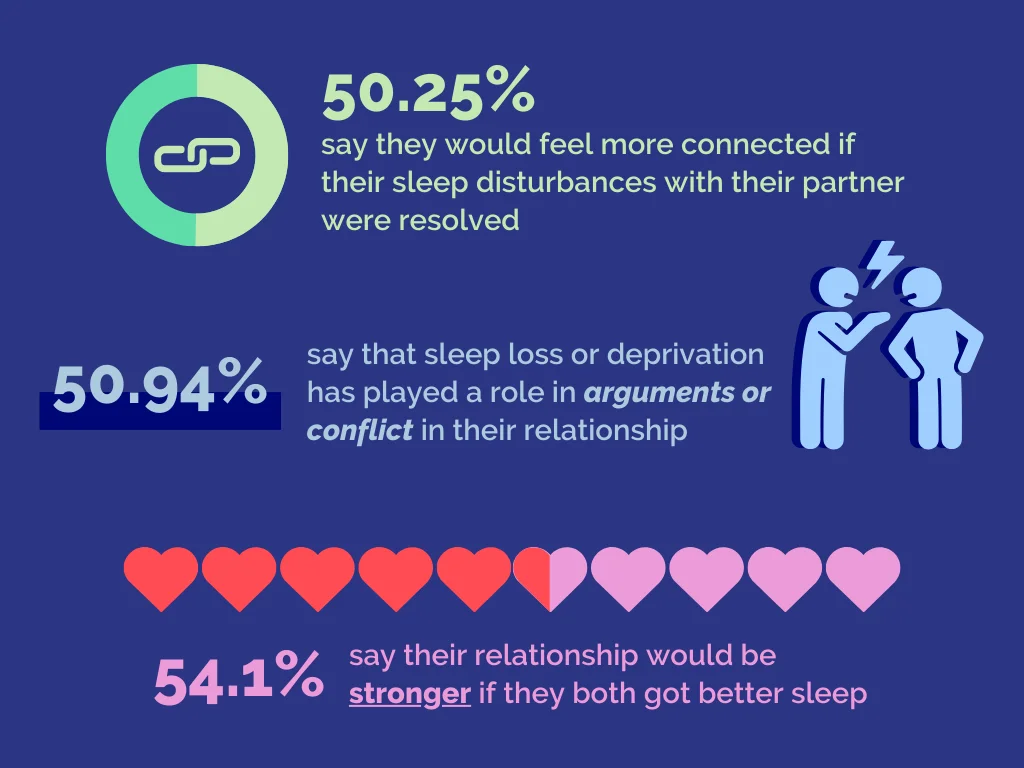
No matter how perfect our sleep schedules seem, sleep loss realistically happens from time to time. “When lack of sleep causes arguments, couples can try a few things to avoid conflict. They should talk openly about their sleep needs without getting upset,” says Dr. Harris.
“Making the bedroom better for sleep and finding schedules that suit both can help. If problems continue, getting help from a pro is a good idea. Most importantly, being understanding about each other’s tiredness can prevent fights.”
Do Women Face More Partner Sleep Challenges Than Men?
Here at Sleepopolis, we’re no strangers to the studies on women and sleep. Research has shown that sleep difficulties in women can often be explained by hormone fluctuations, anxiety and depression, and sleep disorders like insomnia and restless leg syndrome.
Needless to say, we weren’t surprised to notice a few differences in the responses of men and women:
- 67 percent of men say they sleep better next to their partner, compared to 57 percent of women.
- 54 percent of women say they would feel more connected to their partner if the sleep disturbances were resolved, while a smaller percentage of men (46 percent) say the same.
- Men are more likely to disrupt their partner’s sleep, with 61 percent of men saying they are typically the disruptors versus 33 percent of women.
Again, Dr. Harris emphasizes the importance of communication for women facing partner sleep problems: “Women might ignore their own sleep needs, causing discomfort. If not talked about, these unresolved sleep disturbances might create problems in the relationship, especially resentment.”
94 Percent of Sleep Disruptors Report Feelings of Guilt
Let’s face it, most people don’t want to wake up their partner with an obnoxious snore. In fact, 94 percent of our survey respondents who indicated they typically are the one waking up their partner said that they feel guilty about doing so.
Dr. Harris warns, “Feeling bad about disturbing a partner’s sleep can cause issues in relationships.”
If you or your partner starts to feel guilty, Dr. Harris suggests that partners talk openly. “The one feeling guilty can share their concerns, and the partner being woken up can offer support. By talking and working together, they can find ways to improve sleep without blame. This helps ease guilt and makes the relationship stronger.”
80 Percent of People Want More Quality Time With Their Partners Before Bed
Spending uninterrupted time with your partner isn’t always easy. After a long day of work, the first thing you might want to do when you get home is plop on the couch, tune out, and cue up your favorite show.
In addition to regular sleep disturbances, 80 percent of survey respondents shared that they’re lacking quality time with their partners before dozing off at night. And this time, the responses from men and women differed by just 1 percent.
It turns out that spending time together as a couple before bed may be an important factor for connection, and our survey data shows that many couples think so, too.
“Quality time before bed is crucial for couples because it offers a chance to unwind, connect, and strengthen their bond. It’s a moment to share thoughts, feelings, and experiences from the day, fostering emotional closeness and intimacy,” explains Dr. Harris.
“This time allows couples to feel more connected, supported, and understood by their partner, which can positively impact their overall relationship satisfaction. The tranquil moments before sleep can also enhance relaxation, reduce stress, and create a sense of comfort and security within the relationship, promoting better sleep quality for both partners.”
Sleep Divorce Is Reportedly “Very Effective” for 65 Percent of Couples
We’re almost through the data, and it’s fair to say that many partners are facing sleep problems that feel almost unmanageable. Thankfully, there are simple solutions that can help, and no, you don’t have to send your snoring partner to the dog house.
When looking at strategies for mitigating these disturbances, it looks like people are taking to social media for answers. We asked survey respondents which method has been the most beneficial for improving their sleep quality.
Sleeping in separate beds appeared to be the most common — and most effective — solution for our survey respondents. 65 percent of people said that this practice, coined “sleep divorce,” helps their sleep quality significantly. Plus, 27 percent said sleep divorce somewhat helps and only 7 percent said it doesn’t help.
For couples that don’t want to resort to sleep divorce just yet, the Scandinavian sleep method was another popular strategy. This strategy is pretty straightforward; each partner gets their own duvet, eliminating the frustration of cover-hogging. And 33 percent said this method is very helpful. 59 percent said the Scandinavian sleep method is somewhat helpful, and just 8 percent didn’t find it helpful.
Admittedly, Dr. Harris doesn’t love the term “sleep divorce” as it has a negative connotation — when in fact it can be extremely beneficial for some couples and strengthen their relationship. Dr. Harris explains that when opting for a sleep divorce, maintaining connection is important. “Partners can keep close by having special time together before sleeping in separate beds, like talking or cuddling.”
Dr. Harris also notes, “Sleep divorce is not dangerous for relationships as long as partners communicate and reserve time for intimacy to keep their connection strong, even if they’re in different beds.”
Methodology
Sleepopolis commissioned a survey of 1,014 adults in the United States in December of 2023. This survey was conducted through Connect, a crowdsourcing platform for online research. Respondents consisted of 499 men, 500 women, and 14 people that identified as another gender, all of whom indicated that they were married or in a civil union or partnership.
All data is correct as of December 14, 2023. Percentages have been rounded to the nearest whole number for readability.
You are welcome to reference the findings from this survey, including statistics, charts, and quotes, with a link to this page. For any questions about this survey or to connect with our team, please reach out to Brianna Auray at Sleepopolis (brianna.auray@pillarfour.com).
The Sleep Divorce Trend

10 Sleep Trends for 2024: Separating Fads from Science

From Snoring to Stealing Covers: Ways to Cope With Your Partner’s Annoying Sleep Habits



























